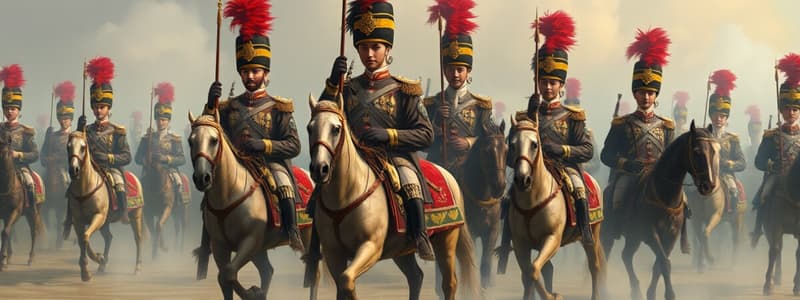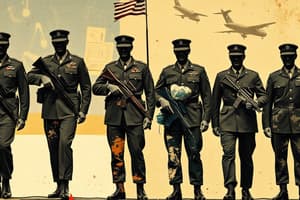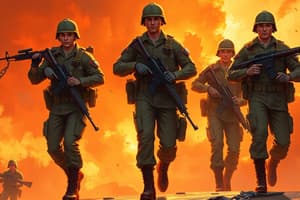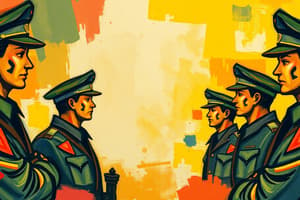Podcast
Questions and Answers
What is the primary purpose of 'trooping the line' in the military?
What is the primary purpose of 'trooping the line' in the military?
- To provide entertainment for the soldiers during downtime
- To assess the fitness levels of the officers
- To conduct physical training for soldiers
- To allow generals to inspect troops and ensure orders are followed (correct)
Which of the following is NOT a benefit of an officer 'trooping the line'?
Which of the following is NOT a benefit of an officer 'trooping the line'?
- Building a personal connection with the troops
- Gaining insights into organization performance
- Understanding how well leadership is perceived
- Ensuring personal accountability for troop training (correct)
Which military branch traditionally gathers sailors and Marines on the ship's fantail or flight deck?
Which military branch traditionally gathers sailors and Marines on the ship's fantail or flight deck?
- Navy (correct)
- Coast Guard
- Army
- Air Force
What time was it when the colonel acknowledged the speaker's intention to go for a walk?
What time was it when the colonel acknowledged the speaker's intention to go for a walk?
What insight was gained from 'trooping the line' based on the author's experience?
What insight was gained from 'trooping the line' based on the author's experience?
What was the primary role of the team mentioned in the chapter?
What was the primary role of the team mentioned in the chapter?
How did the young guard at the Entry Control Point feel about her service?
How did the young guard at the Entry Control Point feel about her service?
What issue was reported at the motor pool?
What issue was reported at the motor pool?
What precaution did the soldier in the guard tower take when the Admiral entered?
What precaution did the soldier in the guard tower take when the Admiral entered?
What motivated Private Joey Benson to enlist in the Army?
What motivated Private Joey Benson to enlist in the Army?
What were the soldiers waiting for during the video conference?
What were the soldiers waiting for during the video conference?
What was the main concern Admiral McRaven discovered during his walkaround?
What was the main concern Admiral McRaven discovered during his walkaround?
Where was the Admiral primarily based during his operations?
Where was the Admiral primarily based during his operations?
What was one of the tasks Private Joey Benson was enjoying while serving?
What was one of the tasks Private Joey Benson was enjoying while serving?
What did the soldier in the tower say about the children throwing rocks?
What did the soldier in the tower say about the children throwing rocks?
Flashcards
Trooping the Line
Trooping the Line
A military tradition where a commanding officer inspects their troops, gathers feedback, and ensures orders are being followed.
Trooping the Line
Trooping the Line
The act of visiting different parts of a military base or unit to observe the troops, check on their progress, and provide leadership.
Trooping the Line
Trooping the Line
The daily or frequent interaction between the leader and their troops, fostering a strong sense of connection and understanding.
Trooping the Line Importance
Trooping the Line Importance
Signup and view all the flashcards
Trooping the Line - Why
Trooping the Line - Why
Signup and view all the flashcards
Special operations force
Special operations force
Signup and view all the flashcards
High-value target (HVT)
High-value target (HVT)
Signup and view all the flashcards
Special operations facility
Special operations facility
Signup and view all the flashcards
Worldwide video conference
Worldwide video conference
Signup and view all the flashcards
Radio communication
Radio communication
Signup and view all the flashcards
Bagram Air Base
Bagram Air Base
Signup and view all the flashcards
Zulu Time
Zulu Time
Signup and view all the flashcards
Walkaround
Walkaround
Signup and view all the flashcards
Support soldiers
Support soldiers
Signup and view all the flashcards
Briefing
Briefing
Signup and view all the flashcards
Study Notes
Trooping the Line: Military Leadership
- Historical Context: Trooping the line—a tradition in the military—involves generals inspecting troops, asking questions, and ensuring orders reach every soldier. Historically, prominent generals (Washington, Grant, Pershing, Eisenhower, Colin Powell, and Ann Dunwoody) have practiced this method.
- Navy/Air Force Equivalents: Similar practices exist in other branches: Navy sailors and Marines gather on ship decks for daily orders and Air Force airmen assemble on flight lines.
- Personal Experience (Admiral McRaven): Daily walks (trooping the line) around a base provided insightful feedback for the organization's well-being and leadership effectiveness.
- Example in Afghanistan: An evening walkaround in Afghanistan's Bagram Air Base revealed important details about issues on the ground including mechanics shortages, malfunctions in laundry facilities, concerns of troops, and low morale.
- Interactions with Soldiers: Interacting with soldiers (guards, mechanics, support staff) provided insight regarding their well-being, morale, and challenges they face in a war zone.
Challenges and Solutions
- Soldier Morale as a Key Factor: Morale is essential for mission success, but is intertwined with the feeling of being valued and supported. Providing adequate supplies for soldiers and addressing their concerns is key.
- Problem Solving at Lower Levels: Leaders should address minor issues at the operational level since they can greatly impact productivity and morale. Ignoring them can lead to inefficiency, ineffectiveness, and low morale.
- Admiral McRaven's Solution: The admiral's inspections pointed out issues like insufficient mechanics, malfunctioning laundromats, and radio battery concerns, emphasizing the importance of addressing issues at the ground level using direct interaction; these were later resolved.
Specific Examples from the Text
- New Guard at Entry Control Point (ECP): A young guard, newly enlisted and from Ohio, was proud to serve but also scared, highlighting the stresses of war.
- Private Joey Benson: Private Benson disliked the Army but valued his fellow soldiers and officers.
- Joint Operations Center (JOC) Activity: The JOC highlighted the completion of several successful missions but acknowledged some soldier injuries, illustrating a balance of success with challenges.
- Watchtower Routine: The watchtower conversations highlighted the soldiers' routine task, and the importance of resources like fresh batteries for communication readiness.
Practical Application of Principles
- The Importance of Leadership: Effective leaders are not just decision-makers but active listeners and problem solvers at all levels, including the operational side.
- Communication is Essential: Leaders must communicate directly with troops to understand issues and to acknowledge their concerns.
- Addressing Operational Issues: Focusing on smaller, logistical problems can boost morale and strengthen operational efficiency.
- Review and Implementation: Commanders should regularly inspect their operational aspects, such as mechanics, laundry, and communication equipment, to address specific concerns and enhance morale and preparedness.
Studying That Suits You
Use AI to generate personalized quizzes and flashcards to suit your learning preferences.
Description
Explore the military tradition of Trooping the Line, where leaders inspect their troops and ensure effective communication of orders. This quiz delves into historical figures and personal experiences demonstrating the importance of military leadership, especially in challenging environments like Afghanistan. Gain insights into how these practices affect troop morale and organizational effectiveness.




